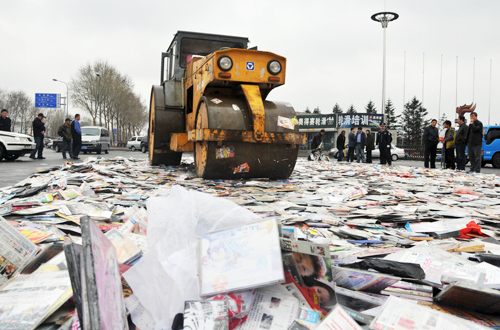|
 |
|
PROTECTING COPYRIGHTS: IPR protection authorities in Changchun, Jilin Province, destroy pirated publications on April 26, World Intellectual Property Day (CHANG YISHU) |
China has been making strenuousefforts to uphold intellectual property laws and individual's ownership rights. The latest steps in its war on knockoff products and IPR violations were announced on December 13 by Vice Minister of Commerce Jiang Zengwei.
The Ministry of Commerce (MOFCOM), Jiang said, is urging various local governments to set up special departments and task forces to combat counterfeits and IPR-related crimes. The long-term goal is to establish a more concrete mechanism to address piracy and protect property rights.
"Compared to special campaigns we carried out in the past, a routine mechanism will be created as we search for a permanent cure to this problem," Jiang said.
To improve China's pattern of protecting IPR, Jiang said, the country has revised and improved relevant laws and regulations, making them more feasible and pertinent, and upgraded those practicable judicial interpretations into laws. China has also increased the amount of fines against IPR infringement and counterfeits, and improved the civil evidence rules to facilitate right holders in presenting evidence.
In 2010 the State Council set up the National Leading Group for Combating IPR Infringement and Counterfeits. From October 2010 to June 2011, 156,000 cases were registered nationwide, involving an amount of 3.43 billion yuan ($541.86 million), with 9,135 underground production facilities and distribution channels destroyed. But eradicating the problem altogether will take time, Jiang said, especially since China is engaged in a massive industrialization and urbanization process. The country's economic and legal systems also need to be improved to facilitate rapid progress on addressing the IPR issue.
"This is going to take some time. Therefore, we need to establish a concrete mechanism to eliminate this problem altogether," Jiang said.
China's way
Most countries worldwide rely on the judicial process to protect IPR. In China, based on its actual situation of administrative and judicial systems, an IPR protection mechanism connecting both administrative and criminal justice measures is adopted.
Strengthening connections between administrative law enforcement and criminal justice departments will involve cooperation and collaboration among related government departments and courts at various levels, according to MOFCOM.
When administrative law enforcement departments discover IPR infringement and counterfeits, they should report to the public security department for investigation, and the latter should decide whether to accept the cases. Local governments at the county level or above should establish mechanisms to consult on IPR infringement and counterfeits. The judicial department should support administrative law enforcement departments in how to handle the case.
Some countries think China's mechanism is effective; others think that although administrative measures are swift to handle cases involving IPR infringement and counterfeits, IPR-related crimes cannot receive due legal punishment with only simple administrative penalties.
The Central Government has also incorporated combating IPR infringement and counterfeits into the performance assessment mechanism for local governments. MOFCOM has been trying to increase publicity on IPR protection to enhance public awareness against IPR violations. It also encourages the public to report cases involving IPR infringement and counterfeits, offering cash incentives for those who turn in IPR violators.
| 